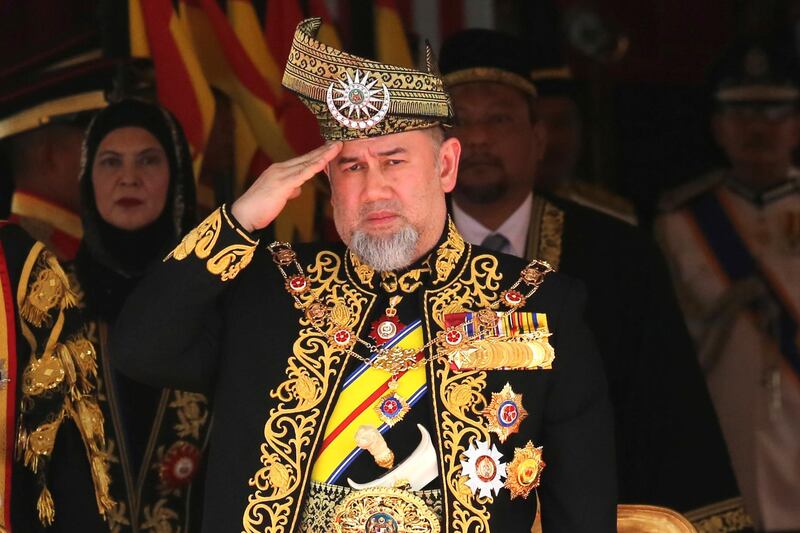Malaysia’s king abdicated on Sunday in a historic first for the country that ended weeks of speculation about his future after he took medical leave and reportedly married a Russian former beauty queen.
Sultan Muhammad V's decision marks the first time a king has stepped away from the throne since the country gained independence from the UK more than 60 years ago.
The national palace confirmed the resignation, with immediate effect, of the 49-year-old, who had been on the throne for two years and was known for his fondness for off-road driving and other extreme sports.
_______________
Read more:
Malaysian party politics have descended into bitter infighting
_______________
“His majesty tells the people of Malaysia to continue to be united to maintain unity, tolerance, and work together,” said a statement from the Comptroller of the Royal Household, Wan Ahmad Dahlan Abdul Aziz.
Malaysia’s Islamic rulers will now meet to decide on the next king.
Malaysia is a constitutional monarchy, with a unique arrangement where the throne changes hands every five years between rulers of the nine Malaysian states headed by centuries-old Islamic royalty.
The system has been in place since independence from Britain in 1957.
Royal officials gave no reason for Sultan Muhammad V’s move but there had been a question mark over the king’s reign since he went on leave for medical treatment in November.
Reports in British and Russian media then surfaced saying that he had married the former Miss Moscow in a lavish ceremony in the Russian capital.
Royal officials in Malaysia have so far not commented on the rumoured marriage, or given details about the state of the king’s health.
British media reports said that he married former beauty queen Oksana Voevodina, 25, in a lavish November ceremony in Moscow at which alcohol was banned and the food was halal. She reportedly converted to Islam in order to marry him. She has since posted herself in a hijab with the king and has reportedly taken on the name Rihana.
She previously worked as a model in China and Thailand before participating in a reality TV show in which she had a relationship with a fellow contestant.
Speculation intensified about the king’s future after his medical leave officially finished at the end of December, and the country’s Islamic royals reportedly held a special meeting last week.
While their role is ceremonial, Malaysia’s Islamic royalty command great respect, especially from Muslim Malays, and criticising them is strictly forbidden.
Sultan Muhammad V, known for his relaxed public persona, studied at Comptroller of the Royal Household, Wan Ahmad Dahlan Abdul Aziz.
According to a report from official news agency Bernama at the time of his enthronement, he “fills his free time by reading and has an interest in extreme sports such as four-wheel drive expeditions, endurance challenges and shooting”.
He is also the ceremonial ruler of the conservative Islamic northern state of Kelantan.
The palace statement said he was “ready to return home to the state of Kelantan to be together with the state government and ... the Kelantanese people”.
There was no indication when the Islamic rulers would meet to pick the next king. During his leave of absence, the ruler of western Perak state had been carrying out his duties.
Portraits of the king and queen adorn government buildings throughout the country. The king is also the symbolic head of Islam in the nation, as well as the nominal chief of the military.
Malaysia’s sultans trace a lineage back to Malay sultanates of the 15th century. The king is referred to as Yang di-Pertuan Agong, or "He Who Is Made Lord".





